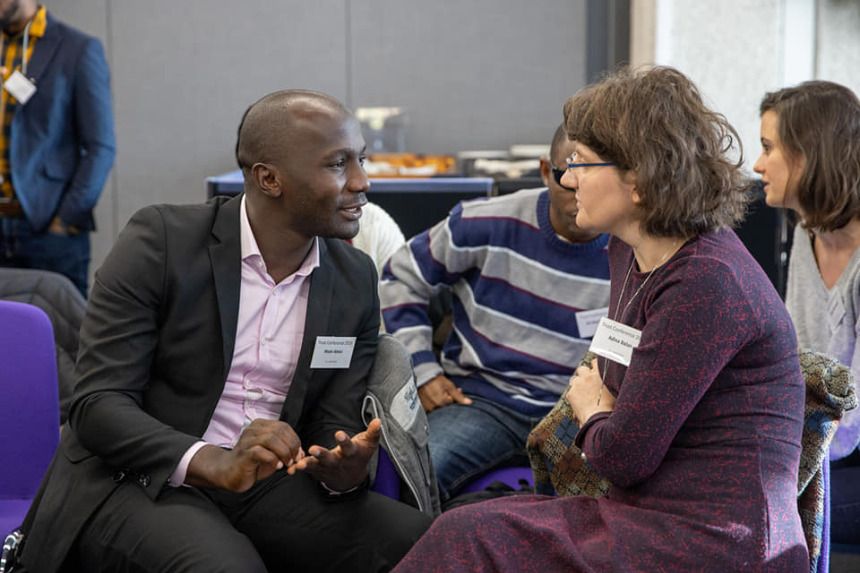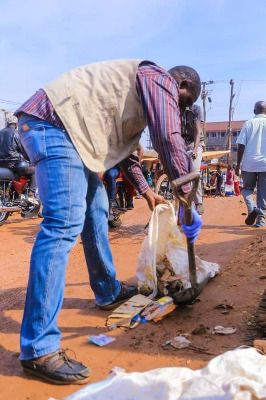Promoting Community Civic Engagement and Biodegradable in Kawempe City Division
The project is addressing the waste management issues through value propositioning it in a product and then organic farming to encourage urban farming; we will address social, economic and environmental challenges through a social enterprise.

Where there are no waste management services, people and communities have no option but to burn or dump their waste in open drainage. These widespread practices increase the spread of disease and the risk of floods, negatively affect local economies and contribute to climate change. In many Instances, that waste management is seen as a role by municipality government, the project will change the tide by increasing citizens and community participation in waste management thereafter through a bottom up approach.We will be able to drive waste sorting at source of generation driving community-based waste management initiatives, which both tackle the local waste crisis and create sustainable livelihoods. These approaches will address underlining vulnerabilities in Kawempe where the impact of poor waste management has continued to impact economically, socially and environmentally
Activity 1: Organize community stakeholder sessions: The community stakeholder sessions will be conducted to support Planning, Mapping, resource mobilization, Promoting Community Engagement and Biodegradable in Kawempe Division, Identification of partners and the delivery plan during project implementation. We will organize 5 meetings in 5 communities for 5 months for the project life cycle .
Activity 2: Identification of site management; we will work with the community to establish a site for waste management and collection. The project team and community will identify an area with in the community for the collection of biodegradable waste that will be used in the formation process of worm and maggot that will be value added to the animal feed. Thereafter the compost will be utilized to promote organic farming and the utilization of organic compost in urban farming that will be sold to women groups in farming sector. The site will be through a community partnership and cost share
Activity 3: Community sensitization campaigns and Training; In Initial project implementation stage, we will organize both community sensitization campaign as well as training for community groups targeting women and youth, we will put emphasis on education for waste sorting and popularizing Goal 13: “Take urgent action to combat climate change and its impacts. This will drive community organizing for waste sorting and management at source of generation in kawempe with aim of reducing waste by creating jobs and opportunities among vulnerable communities in kawempe. The campaign will also serves a mobilization strategy for enhancing young women and/or adolescent and adult involvement, engagement and participation in the project activities. The public campaign match and/or walk will involve movement by a group of people holding out placards, banners and posters with inscriptions on Taking urgent action to combat climate change and its impacts.
We will organize 6campaigns and 6 training targeting 1000 young girls and women and youth in 19 communities
Activity4: Undertaken waste collection and management: Where there are no waste management services, people and communities have no option but to burn or dump their waste in open drainage. During the activity, the project team in partnership with the community members will agree and allocate clear timetable towards for waste collection and management in kawempe in division in partnership Kampala Capital City Authority.
This will help in manage organic waste collected for disposal and recycling site in kawempe to reduce on environmental impact caused by biodegradable waste pollution in the community. We will be able to drive waste sorting at source of generation driving community-based waste management initiatives, which both tackle the local waste crisis and create sustainable livelihoods. These approaches will address underlining vulnerabilities in Kawempe where the impact of poor waste management has continued to impact economically, socially and environmentally.
These will be a sustainable activities that will be undertake through community ownership and collaboration
Activty5; Value proposition of business through Production of maggots and worms; the sustainability aspect of the project will enhance to produce products from waste . Whereas young gilrs will be involved, the project will drive community gender responsiveness to women participation engaged in recycling the collected biodegradable waste to form worm and maggot farming that will be value added to the animal feed. Thereafter the compost will be utilized to promote organic farming and the utilization of organic compost in urban farming. In the end, this project activity will benefit social-economic and environmental challenges that the community has been facing with in the management of compost waste that forms the largest percentages in solid waste among household and communities in Kampala.
Activity 6: Establish community urban farmer gardens using organic fertilizers: Establishing community urban farm gardens using organic fertilizers will be a community social action project designed by and implemented by young girls and women. The urban farm garden will encourage climate smart agriculture where production of vegetables will reduce cost on household food while empower women for sustainable livelihood. We will bring young girls and women together to learn and share ideas on community urban farming using organic fertilizers which will be participatory providing opportunities to test their ideas and learn practically thus contributing to climate change while implementing climate smart agriculture practice
Activity 7: Establish a community waste management fund: Through value propositioning the social action, into viable business, we will divert some of the resources into community waste management fund, this will also provide support to young people willing to start their initiatives through using local resources and more so green business. Furthermore, the project will incentivize to drive community participation in solid waste management among women groups further integrated into the community social action plan for ownership project. At the project scale, projects will directly employ 15 young girls and women among whom will be women from self-help groups, and through a value proposition business model. The purpose is to mobilize and organize women to be part of the waste management solution where the community sorts and collects organic waste at the collection center for maggot farming and composting. This will directly benefit marginalized groups, as well as widows, women living with disabilities, and other disadvantaged women socially and economically while addressing environmental sustainability. The project will be sustained with a contribution as a community waste fund for sustainability
The value proposition of this project will be a social, economic and environment impact on the community of kawempe division.
- Minimized waste that needs to be disposed in centralized landfills
- Reduction on environmental impact caused by biodegradable waste pollution
- Benefit the soil by using organic compost instead of chemical fertilizers for urban farming
- Reduction of costs in managing solid waste with the economic, social and environmental costs;
- Enhance environmental awareness in the community;
- Creation of employment through value propositioned business models
- Project sustainability at the local level;
- 15 fulltime employment opportunities;
- One decentralized SWM project covering 5,000 people, or 1,000 households;
- 400 grams of biodegradable waste per household per day to be composted into organic manure;
- 600 grams of non-biodegradable waste per household per day to be recycled or reused.
Meet the solution owner
